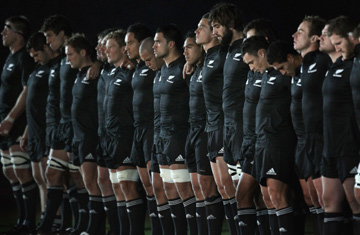
Facing down a challenge New Zealand's All Blacks line up against Scotland in Edinburgh on Nov. 13, 2010. A World Cup win would buoy the rugby-crazy country after February's earthquake
(2 of 2)
"In contrast to European societies — where rugby is just one sport contending for divided public attention and support — rugby in much of the Southern Hemisphere is the sport, and often the activity people build their leisure time around," notes Thion, who himself only switched to rugby after playing basketball in France's elite division. "Of course, on game day — especially during the World Cup — the desire to win is identical everywhere. But generally, societies in the Southern Hemisphere have made rugby a more integral part of their lives, and have larger percentages of their population actively involved as players, coaches and fans."
Perhaps not surprisingly, the smaller the country, the stronger the links between rugby and national identity tend to be. Kiwis like politics professor Gregory acknowledge that New Zealand's intimate relationship and winning ways with rugby have allowed it to project a more distinctive image abroad than the relatively small and remote nation might have otherwise. Conversely, Welsh rugby historian Gwyn Prescott points out that while Australia is known among rugby fans as a power in the game, Oz has attained so much success in so many sports that its Wallabies are less a national icon than South Africa's Springboks or the neighboring All Blacks. "Similarly, Wales, as a nation, seems to associate itself with rugby even more than England, which is generally more obsessed with soccer," says Prescott, author of This Rugby Spellbound People.
That identification with the game is fullest among New Zealanders, who take particularly great pride in being known internationally for formidable rugby teams, for their pre-game Maori haka war dance, and for their traditional black uniforms (reputedly worn in respect for the memory of the All Blacks' victim of the day). In fact, many Kiwis say delineations between the nation, the people, and the sport don't exist. "One way New Zealand rugby has developed and remained strong is by adapting to and integrating the same Maori culture and influences that are spreading elsewhere in our society," says Richard Swain, says Richard Swain, a member of the University of Auckland's medical and health sciences faculty and an ardent All Blacks fan. "We're proud of the way the world identifies New Zealand with excellent rugby, but we're just as proud of the All Blacks for bridging the two main elements of our culture. When a New Zealander sees the All Blacks performing the Maori haka before a match abroad, it's hard to keep a dry eye."
Elsewhere, rugby has played an inverse role by integrating entire countries into the community of elite international sports. According to Nauright, the Pacific island nations Fiji, Tonga, and Samoa got the gift of rugby after World War I from New Zealanders, who'd been tasked with administrating former German territories. Subsequent waves of immigration from the islands to New Zealand allowed physically imposing Polynesian players to perfect their technical and strategic play. That has evolved to the point where all three countries have seen their regular participation and increasing potency in World Cup tournaments earn them a prized place on the global sports map. Fiji and Samoa have both dealt mortal blows to Welsh World Cup dreams in recent campaigns. Tonga — which has the honor of facing the All Blacks in this Cup's opening match — came thrillingly close to denying England a quarterfinal berth in 2007. Last month, Samoa beat two-time world champion Australia 32-23. Players from the three countries — with a collective population of scarcely over 1.1 million—have meanwhile become leading exports to pro leagues in New Zealand, Australia, and Europe.
"If it wasn't for rugby, I'm not sure people would even know Samoa exists," says Pelu Taele, a Samoan international lock who played professionally in Italy and England before joining Coetzee in Biarritz. "It's something everyone in Samoa does — part of daily life. I'd say it's like riding a bike, only we don't have too many bikes in Samoa, but do have lots and lots of people playing rugby. So when you do that abroad — with a pro club or the national team — it's more than just a game. You're playing for your family, your friends, for an entire island that plays, breathes, lives rugby."
The same will be true of the All Blacks, who in addition to the other incentives to win the title will want to lift the spirits of a nation still struggling with losses suffered in the February earthquakes that killed 181. Indeed the city of Christchurch — home to many of the country's top pro clubs and best Players — will not be hosting matches as planned in light of the beatings its stadiums took from the tremors. That legacy of collective calamity, that nation's status as host, and the general primacy of All Black teams over the decades will further fuel hopes and expectations that once rugby's World Cup comes to New Zealand, it'll stay there — at least until the next tournament in four years' time. It sounds like a long-thwarted New Zealand dream destined to be fulfilled this time — though 19 other teams and millions of their fans around the world will be looking to give that dream a good mauling of their own.
